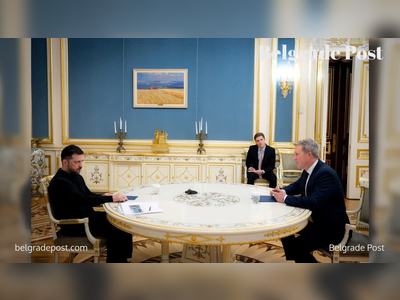
EU Advises Citizens to Prepare Supplies for 72-Hour Emergencies
The European Commission launches a preparedness strategy urging EU citizens to stock essential supplies in anticipation of potential crises.
The European Union has issued guidance to its citizens, recommending that they prepare adequate supplies of food, water, and essential items to last for 72 hours.
This initiative is part of a broader EU strategy aimed at enhancing readiness for potential disasters such as catastrophic floods, wildfires, pandemics, and military attacks.
In unveiling its first preparedness strategy, the European Commission expressed its intent to encourage citizens to take 'proactive measures to prepare for crises,' which includes developing personal emergency plans and stockpiling basic necessities.
The strategy draws inspiration from similar plans in Germany and Nordic countries, where authorities have distributed informational brochures and developed applications advising citizens on how to respond in cases of military aggression or national emergencies.
'Hadža Lahbib, European Commissioner for Preparedness and Crisis Management, stated, 'We say to member states: 72 hours of self-sufficiency is what we recommend.' Directed at citizens regarding what to store, she referred to a video on her social media, showcasing a go-bag for emergencies.
The European Commission is also proposing the introduction of a EU-wide Preparedness Day aimed at raising awareness, integrating preparedness topics into school curriculums, and developing a Union-level storage strategy to ensure adequate supplies of raw materials, shelters, generators, and potentially food and water.
Although the EU does not possess authority over military or civil services, its role in crisis response has increased significantly since the COVID-19 pandemic, which saw joint procurement of vaccines and medical supplies.
The current initiative seeks to advance this effort following a report from former Finnish President Sauli Niinistö, which highlighted a lack of a 'clear plan' for the EU's response to armed aggression against member states.
Reactions to the European Commission's plans may vary among member states, which perceive threats differently.
Recently, the Commission rebranded its military spending plan from 'Rearm Europe' to 'Readiness 2030' in response to concerns raised by leaders from Italy and Spain regarding the potential deterrent effect of the initial title.
In contrast, Northern European countries lead in emergency preparedness planning.
Authorities in Sweden recommend citizens maintain sufficient supplies of water, energy-rich food, blankets, and alternative heating sources, as well as invest in battery-operated radios.
Norway advises citizens to stock up on various medications, including iodine tablets for nuclear incidents.
In Germany, households are advised to adapt basements, garages, or attics for use as shelters, and new housing construction is legally mandated to include secure shelters, a practice already adopted in Poland.
Roksana Minzatu, a Vice President of the Commission, addressed accusations of inducing panic by comparing preparedness to purchasing accident insurance: 'It simply means a desire to be ready and to minimize damage, costs, and suffering that one could potentially face.'
Commissioner Lahbib, who confirmed she keeps a 72-hour supply including ingredients for pasta alla puttanesca, emphasized that it is up to member states to determine necessary supplies 'based on their geopolitical and geostrategic position.'
A Belgian commissioner noted disparities in training across member states, pointing out that in Finland, young people are being taught how to handle weapons, asserting, 'but I don't think that is something you would see here in Belgium or France—at least not immediately.
It varies from country to country, but we can learn from each other.'
This strategy was announced a day after the Danish Ministry of Defense revealed plans to accelerate the introduction of mandatory military service for women, starting in two years.
Beginning in July 2025, women who reach 18 will potentially be required to participate in an annual lottery to determine military service obligations, which is already compulsory for men.
This initiative is part of a broader EU strategy aimed at enhancing readiness for potential disasters such as catastrophic floods, wildfires, pandemics, and military attacks.
In unveiling its first preparedness strategy, the European Commission expressed its intent to encourage citizens to take 'proactive measures to prepare for crises,' which includes developing personal emergency plans and stockpiling basic necessities.
The strategy draws inspiration from similar plans in Germany and Nordic countries, where authorities have distributed informational brochures and developed applications advising citizens on how to respond in cases of military aggression or national emergencies.
'Hadža Lahbib, European Commissioner for Preparedness and Crisis Management, stated, 'We say to member states: 72 hours of self-sufficiency is what we recommend.' Directed at citizens regarding what to store, she referred to a video on her social media, showcasing a go-bag for emergencies.
The European Commission is also proposing the introduction of a EU-wide Preparedness Day aimed at raising awareness, integrating preparedness topics into school curriculums, and developing a Union-level storage strategy to ensure adequate supplies of raw materials, shelters, generators, and potentially food and water.
Although the EU does not possess authority over military or civil services, its role in crisis response has increased significantly since the COVID-19 pandemic, which saw joint procurement of vaccines and medical supplies.
The current initiative seeks to advance this effort following a report from former Finnish President Sauli Niinistö, which highlighted a lack of a 'clear plan' for the EU's response to armed aggression against member states.
Reactions to the European Commission's plans may vary among member states, which perceive threats differently.
Recently, the Commission rebranded its military spending plan from 'Rearm Europe' to 'Readiness 2030' in response to concerns raised by leaders from Italy and Spain regarding the potential deterrent effect of the initial title.
In contrast, Northern European countries lead in emergency preparedness planning.
Authorities in Sweden recommend citizens maintain sufficient supplies of water, energy-rich food, blankets, and alternative heating sources, as well as invest in battery-operated radios.
Norway advises citizens to stock up on various medications, including iodine tablets for nuclear incidents.
In Germany, households are advised to adapt basements, garages, or attics for use as shelters, and new housing construction is legally mandated to include secure shelters, a practice already adopted in Poland.
Roksana Minzatu, a Vice President of the Commission, addressed accusations of inducing panic by comparing preparedness to purchasing accident insurance: 'It simply means a desire to be ready and to minimize damage, costs, and suffering that one could potentially face.'
Commissioner Lahbib, who confirmed she keeps a 72-hour supply including ingredients for pasta alla puttanesca, emphasized that it is up to member states to determine necessary supplies 'based on their geopolitical and geostrategic position.'
A Belgian commissioner noted disparities in training across member states, pointing out that in Finland, young people are being taught how to handle weapons, asserting, 'but I don't think that is something you would see here in Belgium or France—at least not immediately.
It varies from country to country, but we can learn from each other.'
This strategy was announced a day after the Danish Ministry of Defense revealed plans to accelerate the introduction of mandatory military service for women, starting in two years.
Beginning in July 2025, women who reach 18 will potentially be required to participate in an annual lottery to determine military service obligations, which is already compulsory for men.
AI Disclaimer: An advanced artificial intelligence (AI) system generated the content of this page on its own. This innovative technology conducts extensive research from a variety of reliable sources, performs rigorous fact-checking and verification, cleans up and balances biased or manipulated content, and presents a minimal factual summary that is just enough yet essential for you to function as an informed and educated citizen. Please keep in mind, however, that this system is an evolving technology, and as a result, the article may contain accidental inaccuracies or errors. We urge you to help us improve our site by reporting any inaccuracies you find using the "Contact Us" link at the bottom of this page. Your helpful feedback helps us improve our system and deliver more precise content. When you find an article of interest here, please look for the full and extensive coverage of this topic in traditional news sources, as they are written by professional journalists that we try to support, not replace. We appreciate your understanding and assistance.










